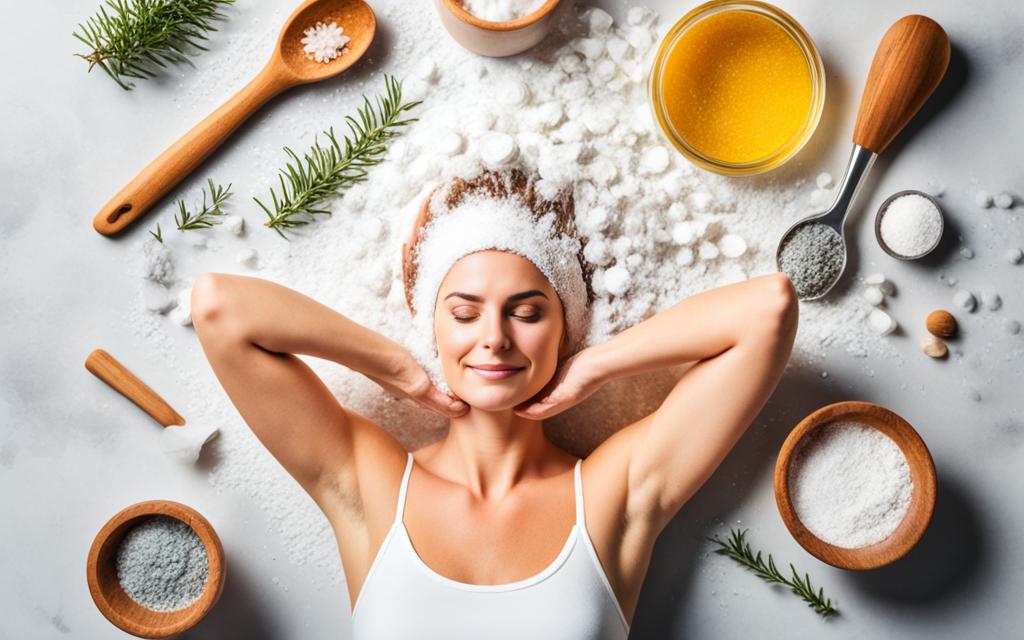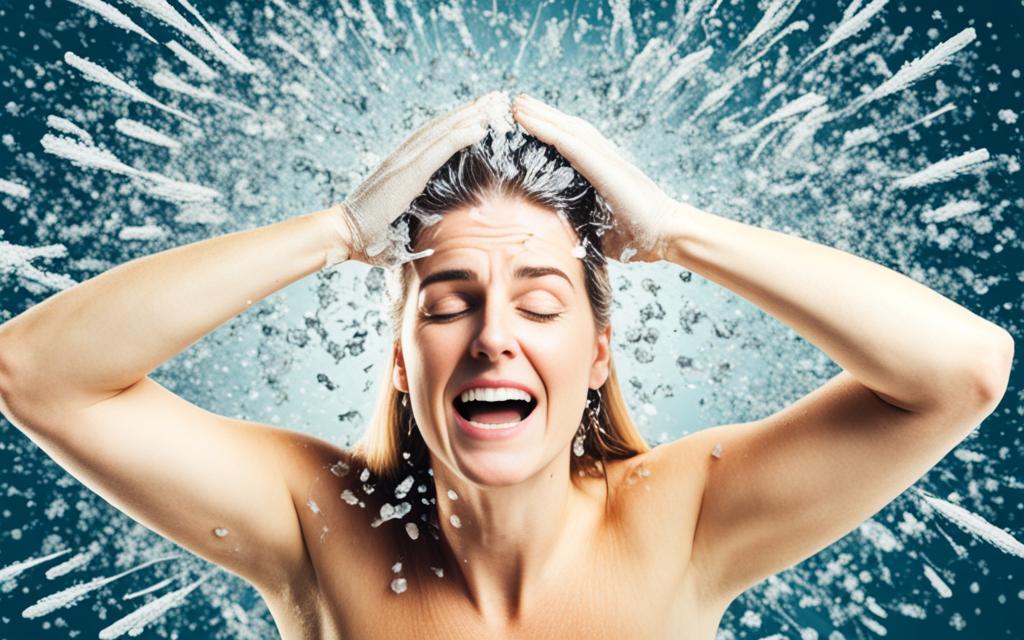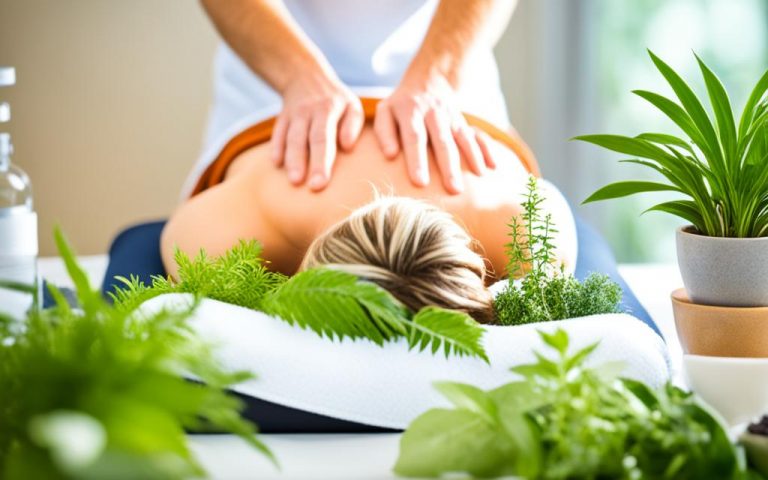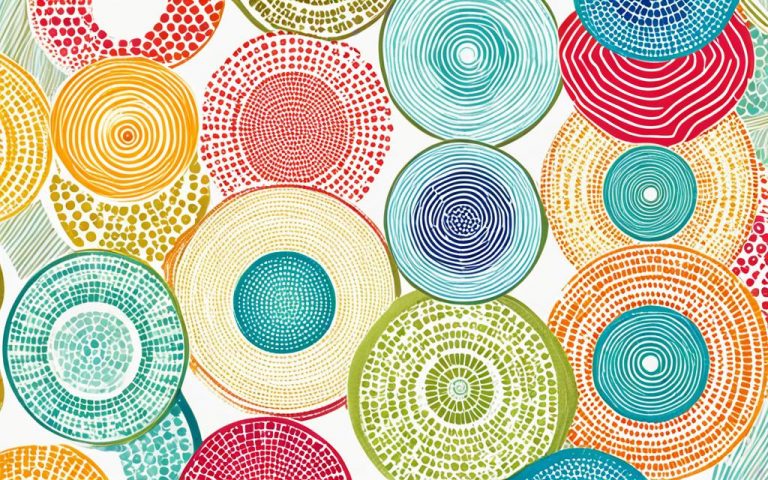Dandruff Home Treatment: Beat Flakes Naturally
If you’re struggling with an itchy scalp and the constant presence of flakes, you’re not alone. Dandruff can be a frustrating and embarrassing issue, but the good news is that there are natural DIY remedies you can try at home to soothe your scalp and get rid of those pesky flakes.
In this article, we will explore effective dandruff home treatments that can help you regain the health of your scalp without relying on harsh chemicals or expensive products. Whether you’re dealing with mild dandruff or more severe symptoms, these natural remedies can provide relief and help restore balance to your scalp.
Key Takeaways:
- Discover natural DIY remedies to soothe your itchy scalp and get rid of dandruff.
- Understand the causes and symptoms of dandruff for effective treatment.
- Learn best practices for maintaining scalp health to prevent dandruff recurrence.
- Explore the benefits of tea tree oil, apple cider vinegar, aloe vera gel, baking soda, coconut oil, neem leaves paste, lemon juice, and fenugreek seeds for dandruff relief.
- Say goodbye to flakes and hello to a healthier, dandruff-free scalp.
Understanding Dandruff: Causes and Symptoms
Before diving into home treatments, it’s important to understand what causes dandruff and the common symptoms to look out for. By gaining insight into the factors that contribute to dandruff and learning how to identify its symptoms, you can take proactive steps towards effective treatment.
What Causes Dandruff?
Dandruff is primarily caused by the overgrowth of a yeast-like fungus called Malassezia on the scalp. While everyone has this fungus on their scalp, some individuals may be more susceptible to its effects, leading to dandruff. Other factors that contribute to dandruff include:
- Excessive oil production on the scalp
- Dry skin
- Irritated or inflamed scalp
- Not shampooing frequently enough
- Using hair care products that irritate the scalp
- Sensitivity to certain ingredients in hair care products
Common Symptoms
Dandruff is characterized by the presence of white or yellow flakes on the scalp and in the hair. It may also cause scalp itching and irritation. Some individuals may experience mild dandruff, while others may have more severe cases that require targeted treatment. Recognizing the symptoms of dandruff is essential for early intervention and effective management.
“Dandruff is primarily caused by the overgrowth of a yeast-like fungus called Malassezia on the scalp.”
To further illustrate the causes and symptoms of dandruff, refer to the following table:
| Cause | Symptoms |
|---|---|
| Overgrowth of Malassezia fungus | White or yellow flakes on scalp and hair Scalp itching and irritation |
| Excessive oil production on the scalp | Oily scalp Flakes that appear greasy |
| Dry skin | Flakes that are dry and small Tight and itchy scalp |
| Irritated or inflamed scalp | Redness and tenderness on scalp Flakes accompanied by inflammation |
| Not shampooing frequently enough | Build-up of oils and dead skin cells on scalp Increased dryness and flaking |
As you can see, dandruff can result from various causes, each with its own distinct symptoms. Understanding the underlying factors contributing to your dandruff will enable you to choose the most appropriate and effective home treatments.
Maintaining Scalp Health: Best Practices
Proper scalp care is crucial when it comes to preventing and treating dandruff. By following a few best practices, you can maintain a healthy scalp and reduce the chances of dandruff recurrence.
Here are some essential tips for scalp care at home:
- Regularly cleanse your scalp: Use a gentle shampoo and conditioner to keep your scalp clean and free from excess oil and dirt. Avoid using harsh products that can strip away natural oils and disrupt the scalp’s balance.
- Avoid excessive heat: Limit the use of hot styling tools such as hairdryers, straighteners, and curling irons, as they can dry out the scalp and lead to dandruff. Opt for air-drying whenever possible and use heat protection products.
- Keep your scalp hydrated: Moisturize your scalp regularly to prevent dryness, which can contribute to dandruff. Use a scalp oil or a natural moisturizer like aloe vera gel to soothe and nourish your scalp.
- Practice gentle scalp massage: Stimulate blood circulation and promote a healthy scalp by massaging your scalp with your fingertips in a circular motion. This can help reduce itchiness and improve overall scalp health.
- Protect your scalp from the sun: Just like your skin, your scalp can get sunburned. Wear a hat or use sunscreen specifically formulated for the scalp when spending prolonged periods outdoors.
- Avoid tight hairstyles: Opt for loose hairstyles to reduce tension on the scalp. Tight ponytails and braids can pull on the hair follicles and lead to scalp irritation and dandruff.
- Manage stress levels: High-stress levels can contribute to dandruff. Practice stress-reducing techniques like meditation or yoga to maintain a healthy balance and promote scalp health.
By following these best practices, you can create a scalp care routine that promotes a healthy environment for your hair and reduces the likelihood of dandruff. Remember, consistency is key when it comes to maintaining scalp health.
Tea Tree Oil: Nature’s Anti-Dandruff Solution
When it comes to natural remedies for dandruff, tea tree oil takes the spotlight. With its potent antifungal and antibacterial properties, this essential oil can effectively combat the fungi that cause dandruff. The soothing properties of tea tree oil also help to relieve the itching and inflammation associated with this common scalp condition.
To use tea tree oil as a DIY dandruff remedy, follow these steps:
- Mix a few drops of tea tree oil with a carrier oil, such as coconut oil or olive oil.
- Apply the oil mixture directly to your scalp, massaging it gently in circular motions.
- Leave it on for about 30 minutes to an hour.
- Wash your hair as usual with a mild shampoo and conditioner.
- Repeat this process 2-3 times a week for best results.
Tea tree oil not only helps to eliminate dandruff but also promotes a healthier scalp. Its refreshing scent and cooling sensation provide a calming effect, leaving you with a fresh and revitalized feeling.
When using tea tree oil, it’s important to remember that it is highly concentrated, so it’s best to dilute it with a carrier oil to avoid any skin irritation. It’s also advisable to do a patch test on a small area of your skin before applying it to your entire scalp.
So, harness the power of tea tree oil to bid farewell to dandruff and welcome a healthier scalp.
The Benefits of Tea Tree Oil for Dandruff:
Here are some key benefits of using tea tree oil for dandruff:
| Benefits | Description |
|---|---|
| Antifungal Properties | Tea tree oil helps to combat the fungi that cause dandruff, reducing flakes and itchiness. |
| Antibacterial Properties | It also has antibacterial properties that can help alleviate inflammation and soothe the scalp. |
| Refreshing Sensation | The cooling sensation provided by tea tree oil provides relief from the discomfort caused by dandruff. |
| Improved Scalp Health | Regular use of tea tree oil can promote a healthier scalp, preventing dandruff recurrence. |
Apple Cider Vinegar Rinse: A Hair and Scalp Tonic
Apple cider vinegar has long been hailed as a powerful natural remedy for various scalp issues, including dandruff. Its antibacterial and antifungal properties make it an effective DIY solution for soothing an itchy scalp and reducing flakes. Making and using an apple cider vinegar rinse is a simple and affordable way to restore balance to your hair and scalp.
To create an apple cider vinegar rinse, follow these easy steps:
- Mix equal parts of raw, unfiltered apple cider vinegar and water in a container.
- After shampooing your hair, pour the apple cider vinegar mixture onto your scalp.
- Gently massage your scalp for a few minutes to ensure the mixture is evenly distributed.
- Leave the mixture on your scalp for about 5 minutes.
- Rinse your hair thoroughly with water to remove the vinegar smell.
- Condition your hair as usual.
Note: Some individuals may find the strong smell of apple cider vinegar unpleasant. If you’re concerned about the smell lingering in your hair, you can rinse your hair with water mixed with a few drops of essential oil of your choice after using the apple cider vinegar rinse.
| Benefits of Apple Cider Vinegar Rinse | How It Works |
|---|---|
| 1. Balances scalp pH | The acidity of apple cider vinegar helps restore the natural pH level of your scalp, creating an environment unfavorable for dandruff-causing fungi. |
| 2. Removes buildup | The acidic properties of apple cider vinegar can help remove product buildup and dead skin cells from your scalp, allowing your hair follicles to breathe and reducing the likelihood of dandruff. |
| 3. Soothes itching | The anti-inflammatory properties of apple cider vinegar can help relieve itching and irritation caused by dandruff, providing relief for your scalp. |
| 4. Promotes scalp health | Regular use of an apple cider vinegar rinse can help maintain a healthy scalp by reducing inflammation, preventing fungal infections, and promoting hair growth. |
Remember to perform a patch test before using apple cider vinegar on your scalp, especially if you have sensitive skin, as it may cause irritation for some individuals. If you experience any adverse reactions, discontinue use immediately.
Expert Tip:
“For best results, use organic, raw, unfiltered apple cider vinegar that contains the ‘mother’—a cloudy substance that contains probiotics and enzymes. This ensures you’re getting the most benefits from the vinegar.”
By incorporating apple cider vinegar rinses into your hair care routine, you can naturally treat dandruff and promote a healthier scalp. Enjoy the refreshing and healing properties of this simple DIY remedy for long-lasting scalp health.
Aloe Vera Gel: Calming the Scalp
If you’re experiencing an itchy scalp due to dandruff, aloe vera gel can be your go-to DIY remedy. Aloe vera is renowned for its soothing properties, providing relief from the discomfort caused by dandruff.
Aloe vera gel has natural moisturizing effects that can help alleviate dryness and itchiness, making it an ideal solution for an itchy scalp caused by dandruff. Additionally, it contains enzymes that can help reduce inflammation and promote healing.
To harness the benefits of aloe vera gel for your scalp, follow these steps:
- Start by extracting fresh aloe vera gel from an aloe vera leaf. You can do this by cutting the leaf lengthwise and scooping out the gel using a spoon.
- Apply the gel directly to your scalp. Massage it gently to ensure that it covers the affected areas.
- Leave the gel on your scalp for about 30 minutes to allow it to penetrate and provide its soothing effects.
- Rinse your scalp thoroughly with lukewarm water.
Repeat this process regularly to maintain a healthy scalp and reduce the discomfort caused by dandruff. Aloe vera gel can also be used as a leave-in treatment, providing ongoing relief throughout the day.
| Aloe Vera Gel Benefits for the Scalp | How to Use Aloe Vera Gel |
|---|---|
| Soothes itching: Aloe vera gel helps alleviate the itching sensation on the scalp, providing immediate relief. | Extract fresh aloe vera gel from a leaf and apply it directly to the scalp. |
| Moisturizes the scalp: Aloe vera gel hydrates the scalp, preventing dryness and reducing the formation of dandruff flakes. | Massage the gel gently into the scalp and leave it on for 30 minutes before rinsing off. |
| Reduces inflammation: Aloe vera gel contains anti-inflammatory properties that can help calm scalp irritation caused by dandruff. | Use aloe vera gel as a leave-in treatment to provide ongoing relief throughout the day. |
| Promotes healing: The enzymes present in aloe vera gel support the healing process of the scalp, aiding in the recovery from dandruff. | Repeat the application of aloe vera gel regularly to maintain a healthy scalp. |
Baking Soda Scrub: Gentle Exfoliation
If you’re dealing with dandruff, a baking soda scrub can be a natural and effective way to exfoliate your scalp and alleviate the problem. Baking soda acts as a gentle exfoliant, helping to remove dead skin cells and flakes from your scalp, leaving it feeling refreshed and renewed. It’s an easy DIY remedy that you can try at home to combat dandruff and promote a healthier scalp.
To create a baking soda scrub, follow these simple steps:
- Mix 2 tablespoons of baking soda with enough water to form a paste.
- Apply the paste directly to your scalp and massage gently for a few minutes.
- Rinse thoroughly with lukewarm water.
- Follow up with your regular shampoo and conditioner.
You can repeat this scrub once or twice a week to keep your scalp clean and dandruff-free. However, it’s important to note that baking soda may not be suitable for everyone, especially those with sensitive skin. If you experience any irritation or discomfort, discontinue use and consult a dermatologist.
Remember, maintaining a healthy scalp is key to preventing dandruff. Incorporating this baking soda scrub into your hair care routine can help remove buildup and keep your scalp balanced, reducing the risk of dandruff recurrence.

Coconut Oil Massage: Nourishing the Scalp
If you’re looking for a natural and effective DIY dandruff remedy, look no further than coconut oil. Coconut oil is packed with moisturizing and antimicrobial properties that can nourish your scalp and help reduce dandruff. By incorporating coconut oil massages into your scalp care routine, you can promote a healthier and flake-free scalp from the comfort of your home.
To give yourself a soothing coconut oil scalp massage, follow these simple steps:
- Start by warming up a small amount of coconut oil in your hands. Ensure that it is in a liquid state for easy application.
- Section your hair and apply the coconut oil directly to your scalp. Use your fingertips to massage the oil into your scalp in circular motions.
- Continue massaging for about 5-10 minutes to allow the oil to penetrate your scalp and nourish the hair follicles.
- Leave the coconut oil on your scalp for at least 30 minutes, or optionally, overnight for deeper conditioning.
- After the desired time, shampoo your hair as usual to remove the excess oil. You may need to shampoo twice to ensure the oil is fully rinsed out.
Regular coconut oil scalp massages can help moisturize your scalp, reduce itchiness, and promote a healthier scalp environment. This can contribute to reducing dandruff and improving the overall condition of your hair.
If you want to enhance the benefits of coconut oil, try mixing it with a few drops of tea tree oil. Tea tree oil has natural antifungal properties that can further combat dandruff-causing fungi.
Now that you know how to give yourself a coconut oil scalp massage, it’s time to indulge in some self-care and nourish your scalp with this amazing DIY dandruff remedy!
Neem Leaves Paste: Traditional Ayurvedic Remedy
Neem leaves have been used for centuries in Ayurvedic medicine for their powerful antifungal and antibacterial properties. This traditional remedy offers a natural solution to combat dandruff and promote a healthier scalp.
To prepare a neem leaves paste, follow these simple steps:
- Gather a handful of fresh neem leaves.
- Wash the neem leaves thoroughly to remove any dirt or impurities.
- Grind the neem leaves into a fine paste using a blender or mortar and pestle.
- Add a small amount of water to the paste to achieve a smooth consistency.
Once you have prepared the neem leaves paste, apply it directly to your scalp and gently massage it in using circular motions. Leave the paste on for about 30 minutes to allow the natural properties of neem to work their magic.
Rinse off the neem leaves paste with lukewarm water and follow up with a gentle shampoo to remove any residue.
This Ayurvedic remedy can be used once or twice a week, depending on the severity of your dandruff. Over time, you can expect to see a reduction in flakes, itchiness, and scalp irritation.
Avoid applying neem leaves paste on open wounds or broken skin, as it may cause a stinging sensation. If you experience any adverse reactions, discontinue use and consult a medical professional.
Embrace this ancient natural remedy and experience the incredible benefits of neem leaves in treating dandruff the Ayurvedic way.
Benefits of Neem Leaves Paste:
| Benefit | Description |
|---|---|
| Antifungal Properties | Neem leaves help combat the fungus that causes dandruff, preventing its recurrence. |
| Antibacterial Properties | The antibacterial properties of neem leaves effectively reduce scalp inflammation and irritation. |
| Relieves Itchiness | The soothing nature of neem leaves provides relief from scalp itchiness associated with dandruff. |
| Natural and Chemical-Free | Neem leaves paste offers a natural alternative to chemical-laden dandruff treatments. |
“Using neem leaves paste for dandruff is a time-tested remedy that harnesses the power of nature to restore scalp health and eliminate flakes. Give it a try and experience the natural wonders of neem.”
Lemon Juice Rinse: Citrusy Anti-Dandruff Solution
If you’re looking for a refreshing and natural way to combat dandruff, a lemon juice rinse might just be the solution you need. The acidity of lemon juice can help balance the pH of your scalp, creating an environment that is less favorable for dandruff-causing fungi. The citric acid in lemons also possesses antimicrobial properties, which can further control the growth of fungi and bacteria on your scalp.
Creating your own lemon juice rinse is simple and can be done right at home. Follow these easy steps to make and apply the rinse:
- Squeeze the juice of one fresh lemon into a bowl.
- Add an equal amount of water to the lemon juice and mix well.
- After shampooing your hair, pour the lemon juice rinse onto your scalp.
- Gently massage the rinse into your scalp for a few minutes.
- Leave the rinse on your scalp for about 5 minutes.
- Rinse your hair thoroughly with warm water.
- Condition your hair as usual.
It’s important to note that lemon juice can be drying, so it’s recommended to use a conditioner afterwards to maintain the moisture balance of your hair and scalp. Additionally, if you have any open wounds or sensitive skin on your scalp, it’s best to avoid using lemon juice as it may cause irritation.
Remember, consistency is key when using any home remedy for dandruff. Incorporate this lemon juice rinse into your hair care routine once or twice a week and monitor the results. If you find that your scalp becomes excessively dry or irritated, discontinue use.
Give this citrusy anti-dandruff solution a try and enjoy the benefits of a healthier, flake-free scalp!
Fenugreek Seeds Mask: Soothing the Scalp
Fenugreek seeds are a natural remedy known for their soothing and moisturizing properties, making them an excellent option for treating dandruff at home. The seeds contain compounds that help nourish and hydrate the scalp, reducing dryness and itchiness.
How to Prepare and Apply a Fenugreek Seeds Mask
- Soak 2 tablespoons of fenugreek seeds in water overnight.
- Grind the soaked seeds into a fine paste in the morning. You can add a little water if needed to achieve the desired consistency.
- Apply the fenugreek seeds paste to your scalp, focusing on the areas with dandruff or dryness.
- Massage the paste into your scalp gently, ensuring it covers the entire affected area.
- Leave the mask on for about 30 minutes to an hour, allowing the nutrients to penetrate the scalp.
- Rinse off the mask thoroughly with lukewarm water.
- Follow up with a gentle shampoo and conditioner.
Repeat this process 2-3 times a week for best results. Over time, the fenugreek seeds mask will help soothe your scalp, reduce dandruff, and promote a healthier scalp environment.
Remember, consistency is key when using DIY remedies. It may take some time to see noticeable improvements, so be patient and stick to your chosen treatment plan.
“Fenugreek seeds are a natural remedy known for their soothing and moisturizing properties, making them an excellent option for treating dandruff at home.”
Benefits of Fenugreek Seeds Mask
The fenugreek seeds mask offers several benefits for your scalp health:
| Benefits | Description |
|---|---|
| Soothes Itchy Scalp | The anti-inflammatory properties of fenugreek seeds can help alleviate itchiness and reduce scalp irritation. |
| Moisturizes Dry Scalp | Fenugreek seeds contain mucilage, a sticky substance that helps hydrate and moisturize the scalp, preventing dryness and flakes. |
| Reduces Scalp Inflammation | The antioxidants present in fenugreek seeds can help reduce scalp inflammation and promote a healthier scalp environment. |
| Fights Dandruff-Causing Fungi | The antifungal properties of fenugreek seeds help combat the fungi that contribute to dandruff, reducing its occurrence. |
By incorporating the fenugreek seeds mask into your hair care routine, you can effectively soothe your scalp, reduce dandruff, and promote a healthier environment for your hair to grow.
Conclusion
By exploring these natural home remedies, you can effectively treat dandruff and restore the health of your scalp. Experiment with these DIY treatments and find the ones that work best for you. Say goodbye to flakes and hello to a healthier, dandruff-free scalp.
FAQ – Dandruff Home Treatment
What causes dandruff?
Dandruff can be caused by various factors, including the overgrowth of a yeast-like fungus called Malassezia, dry scalp, seborrheic dermatitis, sensitivity to hair products, or a compromised immune system.
What are the common symptoms of dandruff?
Common symptoms of dandruff include white or yellow flakes on the scalp and hair, itchy or irritated scalp, redness or inflammation, and a feeling of tightness on the scalp.
How can I maintain a healthy scalp?
To maintain a healthy scalp, it’s important to wash your hair regularly with a gentle shampoo, avoid excessive use of styling products, protect your scalp from harsh weather conditions, eat a balanced diet, and manage stress levels.
How can I use tea tree oil to treat dandruff?
Tea tree oil can be used by diluting a few drops in a carrier oil, such as coconut oil, and applying it to the scalp. Leave it on for about 30 minutes before shampooing. Repeat this process 2-3 times a week for best results.
How do I make an apple cider vinegar rinse?
Mix 1 part apple cider vinegar with 3 parts water and pour it over your hair and scalp after shampooing. Gently massage it into your scalp and rinse thoroughly with water. Use this rinse once or twice a week to help control dandruff.
How can I use aloe vera gel to soothe my scalp?
Apply a small amount of pure aloe vera gel directly to your scalp, massaging it gently. Leave it on for about 20 minutes before rinsing. You can do this 2-3 times a week to help calm the itching and reduce dandruff.
How do I create a baking soda scrub for my scalp?
Mix 1 tablespoon of baking soda with enough water to form a paste. Gently massage the paste onto your scalp, focusing on areas with dandruff. Leave it on for a few minutes and then rinse thoroughly with water.
How can I give myself a coconut oil scalp massage?
Warm up a tablespoon of coconut oil and apply it directly to your scalp. Use your fingertips to massage it in circular motions for about 5 minutes. Leave it on for another 30 minutes or overnight before shampooing.
How do I prepare a neem leaves paste for dandruff treatment?
Grind a handful of neem leaves with a little water to make a smooth paste. Apply the paste to your scalp, leave it on for 30 minutes, and then wash it off with a mild shampoo. Repeat this process 2-3 times a week.
How can I create a lemon juice rinse for dandruff control?
Mix the juice of 1-2 lemons with water in a bowl. After shampooing, pour the lemon juice mixture over your hair, making sure to massage it into your scalp. Rinse it off with cool water after a few minutes. Use this rinse once a week.
How do I prepare a fenugreek seeds mask for my scalp?
Soak 2 tablespoons of fenugreek seeds overnight. In the morning, grind them into a paste and apply it to your scalp. Leave it on for 30 minutes to an hour, then rinse it off with lukewarm water. Repeat this remedy twice a week.







